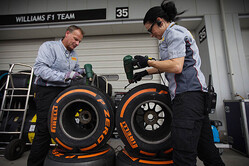


26/02/2014
NEWS STORY
 The teams will get their final chance to test Pirelli tyres and prepare for the forthcoming season at the last four-day test in Bahrain from Thursday.
The teams will get their final chance to test Pirelli tyres and prepare for the forthcoming season at the last four-day test in Bahrain from Thursday.
Coming straight off the back of the previous four-day test in Bahrain, the teams will be able to keep up their momentum as they assess the four new slick compounds in the Pirelli range: P Zero Orange hard, P Zero White medium, P Zero Yellow soft and P Zero Red supersoft. At the first test of the year in Jerez, the teams also got the chance to test the Cinturato Green intermediate tyres and Cinturato Blue full wets. Please see and utilise the attached copyright-free 3D video, the first of a series of to be issued by Pirelli this year, which explains the precise functionality of the tyres.
Here is how the Pirelli Formula One tyre range looks in 2014:
P Zero Orange hard
The toughest tyre of the range is designed for circuits that are often characterised by high ambient temperatures, putting the highest energy loadings through the tyres with fast corners or abrasive surfaces. The compound takes longer to warm up, but offers maximum durability - which frequently means that it plays a key role in race strategy. This is a high working range compound. Like all the 2014 tyres, this is a brand new compound with a new construction to meet the requirements of the latest cars, with increased torque, extra energy recovery systems, but reduced aerodynamics.
P Zero White medium
Theoretically this is the most perfectly balanced of all the tyres, with an ideal compromise between performance and durability. As a result, it is very versatile, but often comes into its own on circuits that tend towards high speeds and energy loadings. This is a low working range compound. As is the case with all the 2014 tyres, there is a new profile at the front to take into account the altered vehicle dynamics and improve handling.
P Zero Yellow soft
This is one of the tyres most frequently used tyres in the range, striking a very good balance between performance and durability, with the accent on performance. It is still biased towards speed rather than long distances, but is nonetheless capable of providing a competitive advantage both at the beginning of the race on full fuel and when used as a 'sprint' tyre at the end. This is a high working range compound. All the compounds are generally slightly harder than their equivalents last year, in order to deliver the same performance despite the extra forces placed on the tyres.
P Zero Red supersoft
The softest compound in the range is ideal for slow and twisty circuits, especially in cold weather, when maximum mechanical grip is needed. The supersoft benefits from an extremely rapid warm-up time, which makes it ideal in qualifying as well, but the flip side to that important characteristic is of course increased degradation. This is a low working range compound. One of the key evolutions this year has been optimisation of the footprint pressure and temperature distribution. This presents a more even contact with the asphalt, improving grip and handling.
Cinturato Green intermediate
The intermediates are the most versatile of the rain tyres, dispersing approximately 25 litres of water per second at full speed. They can be used on a wet as well as a drying track. The Cinturato Green is a new concept for this year, with a number of the development aspects also transferred to the full wet tyre.
Cinturato Blue wet
The full wet tyres can disperse up to 65 litres of water per second at full speed (increased from 60 litres last year) making them the most effective solution for heavy rain. The latest evolution of the Cinturato Blue means that it is also effective on a drying track, with increased durability. The full wet tyre has a new compound and a redesigned rear tread pattern to further reduce aquaplaning. The result of this intensive work is increased driveability in a wide variety of conditions.
"We saw more work on tyres at the recent Bahrain test than there had been at the very first test in Jerez," said Paul Hembery, "and with teams likely to be attempting more qualifying and race simulations this week in preparation for the opening grand prix, we would expect this upward curve of tyre work to continue over the final four days in Bahrain. It's still early days, but so far we've seen both performance and durability from our latest P Zero tyres, which all feature new compounds and structures to maximise the unique power characteristics of the latest-generation cars. The contact patch is greater, to help put down the extra torque, and the working ranges are wider to reduce degradation. As the lap times in Bahrain have shown, we're already very close to 2013 levels of performance, despite much smaller capacity engines and a completely fresh set of technical challenges."
Testing Facts
Teams are allowed an overall maximum total of 135 sets of tyres for testing this year, including the in-season tests. The maximum total for the three pre-season tests is 85 sets of tyres: 25 sets for Jerez and 30 each for the two Bahrain tests.
Teams have a certain number of fixed compound choices totalling 22 sets per car in Bahrain. On top of that each team was also able to choose in advance eight more sets to try in Bahrain. The 'base' slick compounds - 'winter', hard, medium and soft - were selected by Pirelli in advance together with the teams to reflect the characteristics of Bahrain.